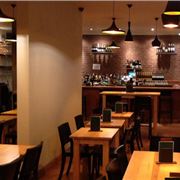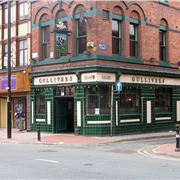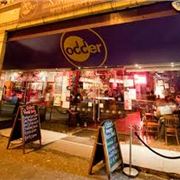JUKEBOXES are great.
A small crowded pub of strangers can become best friends with the right selection of mutually loved tunes sounding out one after another as the ale flows. Just take The Castle or Big Hands' renowned Wurlitzer’s on a busy night for example.
“I’m a musician myself and it’s what I’ve been doing forever, since I left school. This is definitely a positive thing."
Yet there’s still nothing to match authentic live music. We’re not talking stadium sell-out mega gigs here though. More like that beardy guy in the corner playing a ten-minute acoustic version of Psycho Killer whilst people at the bar help carry the chorus, or the band of starry eyed hopefuls honing their craft in anticipation of their shot at the big time.
Thanks to a decade of lobbying, pubs, bars, clubs, cafe’s and a whole host of small venues are about to turn the volume up to eleven... Well maybe actually about six and a half.
The Live Music Act 2012 received Royal Assent and officially became law last week. This new legislation does away with previous red tape surrounding live music in small venues.
Venues with a capacity of less than 200 people can now host live music between 8am and 11pm without the need to apply for a licence to do so. Venues that are licensed to serve alcohol can freely host acoustic or amplified music during these times whilst venues unlicensed for alcohol can host acoustic live music only.
Jo Dipple, chief executive of UK Music, the commercial music industry’s umbrella body, welcomed the news:
“For a Private Members’ Bill to receive Royal Assent is a monumental achievement, even more so for one that is introduced in the House of Lords. This has happened only 5 times in the past decade.
“The global success of our industry is dependent on a flourishing network of small venues, where tomorrow’s headliners can learn their craft and develop their career. Allowing these venues the freedom to host live music is a huge boost for British artists and means more opportunities for developing talent, as well as enriching our local communities and the economy overall.”
For Manchester this could mean a lot more airtime for the city’s countless musicians eager to be heard as well as allowing venues to explore new avenues in making themselves heard above the crowd. For example at Confidential we know the already marvellous Marble Arch on Rochdale Road is interested in hosting live music events following the new legislation.
There are countless other places previously not offering live music that could benefit. Bakerie for example could be a perfect setting for a smooth Sunday evening jazz pianist to accompany a warming glass of red on a candle lit winter night.
Daryl Clarkson, Day Manager at Bakerie, agreed that the change in law offers the bar new opportunities that would previously have been buried in red tape.
 Bakerie“Previously we would have had to have a licence just to put on a double act or a solo artist. We’re not primarily a live music space so it wasn’t a big issue but we now have the opportunity to do so if we want to and we don’t have to worry about getting a licence. That in itself is a big bonus because on a Monday or Sunday evening when it’s quiet we’ve now got the option to put something on and maybe get more people in.”
Bakerie“Previously we would have had to have a licence just to put on a double act or a solo artist. We’re not primarily a live music space so it wasn’t a big issue but we now have the opportunity to do so if we want to and we don’t have to worry about getting a licence. That in itself is a big bonus because on a Monday or Sunday evening when it’s quiet we’ve now got the option to put something on and maybe get more people in.”
“I’m a musician myself and it’s what I’ve been doing forever, since I left school. This is definitely a positive thing.
“There’s never been a shortage of venues, but it’s always nice when you see double acts playing in pubs or bars. For them to now rescind that bill is the end of something that never made much sense in the first place.”
The new act also applies to workplaces. Thus Confidential can now confirm that it will be hosting The Smith’s 2013 reunion gig, NOT Glastonbury. Except it will be acoustic. For staff only. And may be a tribute band... but still.
For many existing venues however, this change has little or no impact. Small venues which already host live music and had obtained a licence will, of course, carry on much the same. Should the law have been this way in the first place? Perhaps if bars which have suffered financially and eventually closed could have offered more in terms of entertainment they could have increased revenue and potentially stayed open.
 GulliversSimon Pierce of Gulliver’s says: “I’ve been in the game a long time and the licensing laws as they were with regards to music depended on the venue. We’re suited to live music here where other venues aren’t necessarily because they’re located too close to the local community where noise could be a problem. So I understand the restrictions on what individual venues could lay on. As far as I’m concerned there was nothing wrong with the law as it was but I guess now we do have an extra bit of scope.”
GulliversSimon Pierce of Gulliver’s says: “I’ve been in the game a long time and the licensing laws as they were with regards to music depended on the venue. We’re suited to live music here where other venues aren’t necessarily because they’re located too close to the local community where noise could be a problem. So I understand the restrictions on what individual venues could lay on. As far as I’m concerned there was nothing wrong with the law as it was but I guess now we do have an extra bit of scope.”
The LMA 2012 is a relaxation in the law which is a far cry from the Manchester Corporations Act (MCA) which was passed in 1965 and all but destroyed live music in Manchester for a number of years. Following a report by Chief Superintendent Dingwall the MCA caused the number of Beat Clubs hosting live music in Manchester to fall from 250 in 1965 to just 3 in 1966. While these venues may have been consigned to history the opportunity for live music in Manchester has now been given a renewed boost.
Adam McLean from Northern Quarter new boy The Blue Pig (part of the Odd group of bars) believes that the change in law will make life a lot easier for independent bars.
 Odder“It wouldn’t apply to us here [Blue Pig] because we’re not suited to it, but Odd definitely, they already have the Shut The Far Cupboard night every third Sunday which is an acoustic night. So there’s already a licence that encompasses that so if it’s already there the change won’t make any odds – poor pun. With Odder and Oddest it could do though, with Odder we’ve just opened a new function space upstairs which is more of a venue/potential clubnight space. If Odd didn’t already have their licence the new act would absolutely make things easier,” he said.
Odder“It wouldn’t apply to us here [Blue Pig] because we’re not suited to it, but Odd definitely, they already have the Shut The Far Cupboard night every third Sunday which is an acoustic night. So there’s already a licence that encompasses that so if it’s already there the change won’t make any odds – poor pun. With Odder and Oddest it could do though, with Odder we’ve just opened a new function space upstairs which is more of a venue/potential clubnight space. If Odd didn’t already have their licence the new act would absolutely make things easier,” he said.
“If you’re making a provision to license a premises to serve alcohol then it kind of goes hand in hand with the same provision for entertainment. I think in terms of how licensing laws have gone recently there’s been a bit more relaxation in how it’s been dealt with in terms of a national concept but then in terms of how Manchester City Council have approached it, they’ve been more prohibitive in who they give licences to.
“But anything that lets a small business, especially a small independent bar to get a head start is much better.
“It’s something to be encouraged certainly, there’s plenty of bands out there looking for gigs, especially in Manchester, people want places to play. There are fun times to be had.”
You can follow Ben Robinson on Twitter here @BenPRobinson










